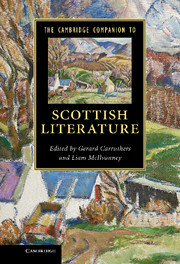Book contents
- Frontmatter
- Contents
- Notes on Contributors
- Acknowledgements
- Chronology
- Introduction
- 1 Scottish Literature before Scottish Literature
- 2 The Medieval Period
- 3 Reformation and Renaissance
- 4 The Aftermath of Union
- 5 Robert Burns
- 6 Enlightenment, Romanticism and the Scottish Canon
- 7 Scott and the Historical Novel
- 8 The Gaelic Tradition
- 9 Scottish Gothic
- 10 Victorian Scottish Literature
- 11 Robert Louis Stevenson
- 12 Hugh MacDiarmid and the Scottish Renaissance
- 13 Popular Fiction
- 14 Muriel Spark
- 15 The Glasgow Novel
- 16 ‘What is the language using us for?’
- 17 The Emergence of Scottish Studies
- 18 Otherworlds
- 19 Scottish Literature in Diaspora
- Index
- References
2 - The Medieval Period
Published online by Cambridge University Press: 05 January 2013
- Frontmatter
- Contents
- Notes on Contributors
- Acknowledgements
- Chronology
- Introduction
- 1 Scottish Literature before Scottish Literature
- 2 The Medieval Period
- 3 Reformation and Renaissance
- 4 The Aftermath of Union
- 5 Robert Burns
- 6 Enlightenment, Romanticism and the Scottish Canon
- 7 Scott and the Historical Novel
- 8 The Gaelic Tradition
- 9 Scottish Gothic
- 10 Victorian Scottish Literature
- 11 Robert Louis Stevenson
- 12 Hugh MacDiarmid and the Scottish Renaissance
- 13 Popular Fiction
- 14 Muriel Spark
- 15 The Glasgow Novel
- 16 ‘What is the language using us for?’
- 17 The Emergence of Scottish Studies
- 18 Otherworlds
- 19 Scottish Literature in Diaspora
- Index
- References
Summary
Attempting an assessment of medieval Scottish literature means dealing with a definition of this literature within a strongly defined national context, a topic that has drawn considerable attention in recent decades. In 1991, the journal Studies in Scottish Literature dedicated its twenty-sixth volume to ‘The Language and Literature of Early Scotland’, publishing the proceedings of the sixth conference of the International Association for Medieval and Renaissance Scottish Language and Literature, and providing a unique opportunity to assess the state of criticism on the subject; the volume attempted at the same time a definition of the Scottish literary canon in the late Middle Ages and the early modern era. Significantly, the opening contribution of the collection, by Roderick J. Lyall, was titled ‘“A New Maid Channoun”? Redefining the Canonical in Medieval and Renaissance Scottish Literature’. From this point on, it was clear – something often repeated in recent histories of Scottish literature – that medieval literature written in Older Scots could be considered the starting point of national literature, the moment of unification that determined the course of the succeeding canon. Literature and nation-building are inseparable concepts when we take into consideration late medieval English literature: from John Gower onwards, the very choice of language implies a political statement. As one surveys the Scottish literary production of the same period, it appears equally concentrated on a definition of the nation, showing a unity of purpose in excess of anything in its English counterpart. The history of Scotland up to the Union of the Crowns is of course independent of English affairs, and it is impossible to take into consideration the key dates of English history, such as the Battle of Hastings or the beginning of the Tudor dynasty, and apply them to the development of the Scottish nation: one must take into account different historical moments, and thus find different time boundaries.
- Type
- Chapter
- Information
- The Cambridge Companion to Scottish Literature , pp. 27 - 40Publisher: Cambridge University PressPrint publication year: 2012

